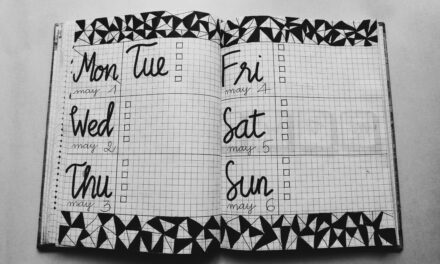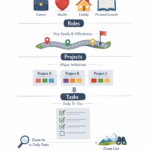
5 Tips to Help You Deal with a Change in Environment

Carefully cultivating your environment to allow you to optimize your time, minimize effort, maximise efficiency, and encourage productivity is one of the best things you can do. So, what do you do when you’re lifted out, unceremoniously, from the surroundings you’ve perfectly honed to set yourself up for success and follow through with your most important habits?
There have been a few times in my life when I’ve had to deal with a big change in environment temporarily. I’m left having to get used to a new environment, a new way of living, and with new objects and people surrounding me.
It can be quite overwhelming and can often leave you in chaos pretty quickly as you soon come to realise how automated so much of your old life had become in your old set-up. This happened to me recently when I moved out of my rented flat and I am currently waiting for my next permanent living situation to materialize with an estimated ETA of 1 month (meaning 3 months in limbo).
So, with this experience fresh in my mind, here are my 5 tips to help you deal with a temporary change of environment:
- Recreate the most important parts of your old environment.
- Learn, adapt, and be flexible.
- Readjust your schedule to align with your new housemates.
- Understand the pros and cons of each new living arrangement: enhance the positives and reduce the impact of the negatives.
- Replace your regular hobbies, and exercise schedule.
1.) Recreate your non-negotiables

There are certain non-negotiables in your daily routine. It may be your exercising, or it may be your work set-up. Whatever it is for you, make sure it’s set up and as easy for you to complete as possible.
When I moved to my new environment I knew I wanted to wake up early. In my old environment, I had my alarm box routine, which whilst crazy, is important for me to hit my goals effectively. I have re-created a new version of this in my new environment.
My desk set-up was another really important aspect of my new environment. Setting your environment to reduce the amount of emotional discomfort you feel when completing a task is a key strategy to allow for maximum productivity (and helping your mental health in my opinion).
My desk set-up is such that I can simply turn on my loop pedal, grab a plectrum and practice my guitar in the morning in seconds. I can access all of my vision therapy equipment (I currently have a squint I am trying to correct) and can start practising whenever I feel.
My work laptop, mouse and keyboard are set up as desired. I can switch to my personal laptop which sits just below my work laptop which is mounted on a stand. I can move my monitors around as desired in order to complete different tasks on the computer optimally. All of my chargers are plugged in and tucked away neatly so I can plug in and plug in all electronic items without needing to search or rearrange wires.
So much of my day relies on this that I re-created it straight away. My desk is foldable and portable so I was able to take this with me. A small amount of effort here has meant a massive step in helping to retain my productivity levels and efficiency in my new environment.
2.) Learn, adapt and be flexible.

When you are in your new environment, no matter how hard you try to recreate your old habits, schedule, and set-up – you will almost certainly encounter issues that were not issues in your old setting.
For example, my wonderful desk setup mentioned above now had a big flaw. My vision therapy string and electronic wires were now constantly under threat by two cats insistent on chewing anything in sight. My re-created alarm system no longer forced me outside to wake me up. My gym was also now much further afield (I previously used to walk there).
These are all things, that whilst not ideal were nothing that a little learning and adapting couldn’t solve. Expect these sorts of issues to occur and you can adapt your set-up and situation quickly to overcome them. In the first weeks you’ll quickly realise what the new issues are. If you can adapt quickly the issues left will be far smaller and less urgent to solve.
3.) Realign your schedule to align with your new housemates.

I’ve discussed in previous posts how people are the biggest culprits for throwing your plans and schedule into disarray. Often with untimely interruptions that can take a big chunk of your precious time away. However, people can be predictable – especially on average across a large period of time. That large time period that you are now spending with the new people in your environment.
If you know your new housemates schedule you can use this to sync it up with yours. When your housemate is out, that’s when you have your uninterrupted project work time. When your housemate is at the gym – go with them at the same time.
Your housemate likes to cook at a specific time most nights? Maybe cook before or after to avoid a clash. In this way, you can use their schedule to your benefit. Avoid them impinging on your important tasks and vice versa.
It may mean your own schedule now looks widely different to before. But that will only be if the people you are now cohabitating with are different to those who you were with before. Otherwise, the changes will probably only need to be small.
4.) Understand the Pros and Cons of Your Change in Environment

Your old environment will have it’s positives and negative aspects. So will your new environment. Work out the positives and double down. Does your new location no longer have access to an array of shops 5 mins away, but instead is situated in the countryside with beautiful walks? Change your morning walk for a coffee to a morning run.
You get the idea. It will take time to understand what the positives and negatives are, but being open to change – both in your schedule and the type of activities you undertake – can get you a big step further to thriving in your new environment.
5.) Replace your regular hobbies and exercise schedule

People and exercise are two things that can give you a lot of energy. Moving to a new environment, especially a more remote one as was the case with myself recently, has the potential to leave you feeling isolated.
I think for both your mental and physical health you should at least try to maintain the same levels of human interaction and exercise you were experiencing before your move.
You can replace one form of exercise with another if needed. The benefits of exercise and socializing are well known. When you’re in a new place and you’ve lost your routine, the importance of maintaining your mental and physical well-being increases.
Summary
It’s never easy moving to a new place, especially if it happens suddenly and unexpectedly. But there is a lot you can do to bring back order into your life and allow yourself to be productive and efficient – even without your ideal set-up.
By understanding the positives and negatives of your new situation, as well as recreating some of your most important spaces (such as my desk set-up), you may find yourself with new habits and routines – but hopefully similar levels of productivity and output.
Allow yourself to work with the changes instead of fighting them. Because, you can’t fight interruptions and unaccounted-for events in life. They are inevitable and there will always be an infinite amount of curveballs and an infinite to-do list. So to simplify the post above in a sentence – go with the flow – but be strategic about it.
Leaving it there,
Alex














